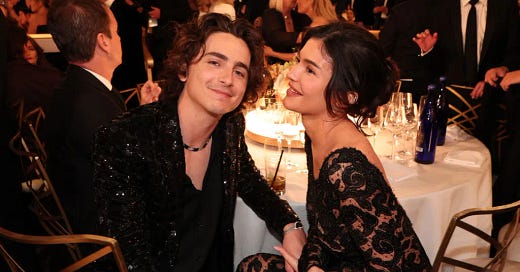
The Free Press

Today from The Free Press: A dispatch from the Great Plagiarism War of 2024, an update from Israel, more on the Great Scramble, and an apology from Suzy Weiss.
But first, today’s lead story. . .
We’re told to trust doctors, that they have our best interests at heart. But when two siblings—one a Stanford-trained doctor, the other also a medical professional—were faced with their mother’s stage 4 cancer diagnosis, they chose to go against doctors’ orders.
“The final thirteen days I shared with my mom were the most meaningful of my life. If we had taken the advice of the medical system, they wouldn’t have happened,” says Casey Means.
Read about her decision to go against medical advice in an excerpt from Casey’s new book, Good Energy: The Surprising Connection Between Metabolism and Limitless Health, below.
The Great Plagiarism War of 2024
You may think you’ve heard everything you need to know about the obscure dissertations and missing quotation marks of college bureaucrats and professors whose names you’ve never heard and whose subjects have literally zero bearing on your life.
But no. No, my friends. We are just beginning the Great Plagiarism War of 2024.
The latest round of fighting involves a woman named Neri Oxman. Oxman is a designer and a former tenured professor at MIT.
But for the purposes of this story, Neri Oxman is the wife of billionaire hedge funder and (as of the past few months) higher education crusader Bill Ackman.
Which is why Oxman, who left MIT three years ago and is now building a start-up, is even in the news at all. When Ackman, angered by his alma mater’s handling of antisemitism on campus after October 7, went after Harvard’s then-prez Claudine Gay for committing plagiarism, the next move, for some, was obvious: go after Ackman where it would hurt the most.
So on Friday, Business Insider identified nearly thirty examples of apparent plagiarism by Neri Oxman. They involve omitting quotation marks when citing other scholars’ work (though in three of the instances she included their names) and lifting descriptions from Wikipedia entries including for “Weaving” and “Heat flux.”
The outlet admitted it reported on Oxman because of her husband’s mission to oust Claudine Gay as president of Harvard amid claims of her own plagiarism (which he wrote about for The Free Press last week). BI paints Ackman as a hypocrite for going after Gay for conduct similar to that of his wife. “Ackman seized on revelations that Harvard’s president, Claudine Gay, had plagiarized some passages in her academic work to underscore his calls for her removal.”
We can spot at least a few differences between the two cases. Oxman left academia in 2020, while Gay ran the most prestigious university in the world.
Oxman immediately stated on X that she was sorry for any mistakes and would review her sources and citations and “request that MIT make any necessary corrections.” (Gay passed the buck. “Never did I imagine needing to defend decades-old and broadly respected research,” she complained in a New York Times op-ed.)
Oxman’s oeuvre spans more than 80 peer-reviewed papers and book chapters as well as 15 patents, but her dissertation and two papers have been found to contain evidence of plagiarism. Meantime, Gay has written 11 papers over the course of her career, and eight of those papers contain 50 instances of plagiarism.
But this is war. Ackman accused BI of going below the belt by targeting his wife and calling his kids’ phones. “Even the mafia operates with more dignity and respect for family,” he wrote. Oh, Bill. Let’s not paint with a broad brush and compare the good people of the mob to our country’s most corrupt enterprise.
Axel Springer, BI’s parent company, has announced it will “review the processes around these stories to ensure that our standards as well as our journalistic values have been upheld.”
Ackman wrote on X that he is now “launching a plagiarism review of all current MIT faculty, President Kornbluth, members of MIT’s administration, and its board.” We would not be surprised if the remit expands to some journalists as well.
For more on the crisis in higher education, we recommend Josh Barro’s latest: “Universities Are Not on the Level.”
‘Whatever It Takes’
The war in Israel is at a crucial moment. Consider these developments, all from Monday:
A senior Hezbollah commander was killed in a suspected Israeli strike in Southern Lebanon, further stoking fears of a wider war with the Iran-backed terror group.
Israel’s chief military spokesman told The New York Times Monday that the war against Hamas had “shifted a stage.” The Times reports the next phase will involve a campaign in the southern Gaza strip with a smaller force of elite troops on surgical missions “to find and kill Hamas leaders, rescue hostages and destroy tunnels.”
U.S. Secretary of State Anthony Blinken met with Saudi Crown Prince Mohammed bin Salman and said an end to fighting in Gaza and steps toward Palestinian statehood were preconditions of Saudi diplomatic recognition of Israel.
Joe Biden, confronted by protesters in a speech in South Carolina, said that he had been “quietly working with the Israeli government to get them to reduce and significantly get out of Gaza.”
To help make sense of Israeli thinking right now, I spoke to Haviv Rettig Gur, senior analyst at The Times of Israel. (This conversation he recorded with Dan Senor on October 8 is among the most powerful since the war began.) He described to me a country clear-eyed about what its objectives are in this war, determined to finish the job, and unlikely to be swayed by outside pressure.
He made three important points.
On Biden’s approach to the conflict:
The Biden administration really needs Hamas gone, if only so that it can pressure Israel on a Palestinian state. Biden’s policy has been astonishingly intelligent and thoughtful and careful and sharp up until now. He understood on day one that he did not have the option to prevent the war. . . . Biden had to choose between a big, multifront war in which Israel feels very vulnerable and fights much more ferociously, or giving Israel a bear hug to make it feel safe and allowed to fight carefully and slowly. He did the latter.
Joe Biden saved a lot of Palestinian lives. He also saved a lot of Israeli lives, in embracing Israel. The Democratic Party’s left wing doesn’t understand that, if it had been in charge, this war would be twice as bad. Twice as bad for Palestinians.
On whether Israel can fight Hamas and Hezbollah at the same time:
Of course it can. Israel can take on Hezbollah and Iran and the Houthis and the militias in Syria and Iraq all at once. It would just be a horrific war. The larger the disparity in power between the Israelis and the enemy, the less firepower the Israelis have to use, the less destruction. If Hamas is finished, we can just fight Lebanon and it can be something where the world can demand of us to be very, very targeted and very careful in Lebanon.
On October 7 as a wake-up call:
We woke up to the idea that we had completely misunderstood the enemy, their threats, and this immense noose that Iran has built around us.
Our security situation is better, not worse, now, because we now know how bad it is. Beforehand, we didn’t know. There is a willingness to fight this war to the end, whatever it takes. The enemy has convinced us—and I don’t mean our strategic elite, I don’t mean our political elite, I don’t mean right-wingers spouting off populist slogans—I mean, they have convinced the most ordinary Israelis from the deep left to the deep right that they genuinely want to murder us all. I have never seen this kind of unity among Israelis.
The Israeli public, if it doesn’t have a government that gets rid of Hamas, it will replace it with one that does. And it will keep replacing those governments until it finds the government that will do the job. We will get rid of Hamas. Hamas’s only choice is the cost Israelis and Palestinians are going to pay for that to happen.
From our newsroom. . .
→ Unscrambled: Yesterday we published “The Great Scramble,” Free Press senior editor Peter Savodnik’s brilliant look at the growing group of Americans who feel politically homeless. I loved Peter’s piece; it put a face on one of the most important big-picture stories in American politics right now.
From a lesbian trucker who voted Trump—and then Biden—to an Indian immigrant homeschooling her kids, who once felt like a Democrat but is now leaning toward Vivek Ramaswamy, Peter profiled voters who feel out of step with our two political parties. If you haven’t read it yet, please do.
But I was curious: What did Peter think was the one big lesson from the people he profiled? His answer:
These voters are not in any one camp. Nor are they moderates. They simply have a smorgasbord of opinions that don’t neatly fit into either side’s worldview. And they feel strongly about these commitments. But they all share a kind of live-and-let-live liberalism that was once the norm in American politics. Their stories illustrate the failure of both parties to reimagine themselves for America as it is today, not as they wish it to be.
There’s something else about these people that was really compelling to me, and that is that all of them seem to me like good people. What I mean by that is they seem old-fashioned but in the best way—free of the ugly, uncharitable, illiberal impulse that has come to characterize so much of our politics.
None of these people are put off by the notion of having to live alongside people who disagree with them. They regard that as a blessing of living in a democracy. That is where so many Americans are, and what so many crave, even those who can’t bring themselves to admit it. Because deep down we know that we’re not always right.
Stay tuned for more reporting from The Free Press on the profound changes driving our politics.
→ Prediction audit: Hi, Free Pressers. Suzy Weiss here. You may have heard my appearance on Honestly talking about my cultural predictions for 2024. I’d like to note that since we recorded our show, Alison Roman has debuted a new recipe for soup, “Squash with Lentils and Herbs” (I’m bullish on peasant foods in 2024) and that the Mean Girls movie musical arrives this weekend (cue the Reneé Rapp mania).
But Sunday night’s Golden Globes have revealed that just maybe I got something wrong. It appears, dear readers, that Kylie Jenner and Timothée Chalamet are, indeed, in love. I had labeled them a psyop, a stunt, two people who had possibly never been alone in the same room. But the Globes fan cam caught them staring deeply into each other’s eyes and kissing—though oddly, with no lip-to-lip contact (there may have been glam concerns at play)—looking very much to the whole world like two starlets in love.
A value we hold dear at The Free Press is the ability to admit when you’re wrong. In a case where the stakes are so high, my name is on the line here, I’m simply not willing to go that far. But I will allow for the fact that love is a mysterious thing, attraction a messy chemistry, and perhaps Kylie and Timmy will last a few more months than I’d anticipated.
Oliver Wiseman is a writer and editor at The Free Press. Follow him on X @ollywiseman.
Become a Free Press subscriber today:

















Israeli ex-pat here. Your points about the Gaza war are 100% on target. I will add that Israelis are unlikely to accept a Palestinian in the foreseeable future, because they do not trust Palestinians to keep their side of the bargain. We see the 2005 withdrawal from Gaza as an experiment that blew in our face.
Timothée Chalamet and Kylie Jenner... I don't know who they are and don't want to know who they are. The gossip goings on of Hollyweird and adjacent are of double-nought fuck-all interest to me at the best of times; but least of all in a serious news source. Please don't give oxygen to things that need to have died yesterday.
By the way: "old fashioned" is one of the things that conservative means.